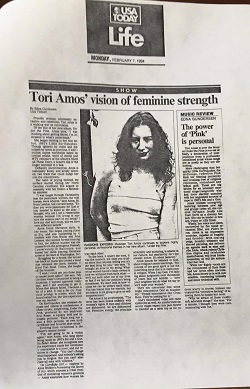|

songs | interviews | photos | tours | boots | press releases | timeline
USA Today
February 7, 1994
Tori Amos' vision of feminine strength
by Edna Gundersen
Proudly sensual, adamantly eccentric and rebellious, Tori Amos is a walking war on convention.
of the title of her new album, Under the Pink, Amos says, "I was thinking about getting flayed, I'm interested in what's underneath."
She began delving in her solo debut, 1992's Little Earthquakes. Though ignored by radio and dismissed by some as precious, it sold 1 million copies worldwide based on critical praise, word of mouth and MTV exposure of the albums Silent All These Years, a bizarre clip of the singer enclosed in a box.
Defiantly uncommercial, Amos is noticable kooky and amply talented, two traits that could nudge her into the mainstream.
Her habit of prying beneath the surface started during her North Carolina childhood. She argued incessantly with her father, a Methodist minister.
"I was taught through Christianity that the passionate women, the wild horses, were whores," says Amos, 30, from London, her current home. "Either you were passionate for God or you needed to kneel at the altar. I thought, why am I not a respectable woman because I'm trying to nurture the sensual part of my being? I love my dad and mom, but we have very different beliefs."
Amos found liberation early, in her music. She began playing piano at 2 1/2, and was composing by 4. Smitten with Fats Waller and John Lennon, she resisted formal training. In fact, the difficult student was dismissed from the prestigious Peabody Conservatory in Baltimore, and honed her skills playing Gershwin tunes in the bars of Washington, DC.
Struggling for a break, she turned her back on piano and joined a band that released the lame, metallic Y Kant Tori Read. Today, she laughs off the blunder.
"I wish I could getinto those plastic snake pants again!" she says. "My life then wasn't committed to being a musician. I wanted approval really bad, and I did anything to get it. When that album failed, I became a bit of a joke. It was a far cry from child prodigy to bimbo, which Billboard called me. But that experience was my teacher."
On Earthquakes, she released demons and visions in confessional, if often cryptic, songwriting. Under the Pink, produced by her boyfiend, Eric Rosse, is equally bold and intensely personal. "Each song has a soul, a little persona, its own birth certificate and favorite shoe sps."
Evolving from victimhood is the album's central theme.
"I'm not going to be a victim again," says Amos, who sang about being raped on 1992's Me and a Gun. On Baker Baker, she recognizes how the experience made her emotionally unavailable to a lover, and she resolves to change. "You can't change what happened, and nobody's asking you to forgive. But you can't associate all men with violence."
On Cornflake Girl -- inspired by Alice Walker's Possessing the Secret of Joy, which exposes a tribal tradition of mutilating women's genitalia -- Amos examines how women betray each other.
"In the book, it wasn't the men, it was the mothers, the ones ou trusted more than anyone, telling you it's the best thing for you," she says. "It brought an ache to my being. What we as women haven't really owned is how we withhold from each other -- we'll cut each other out of our lives so fast if we feel our position's being threatened. We don't look at how vicious we can be toward each other. You can blame men for eternity, but the blame is not going to give us self-empowerment."
Yet Amos is no archfeminist. "The term has been linked selfishly with women's rights. If men and children are dishonored, we are dishonored too. Feminine energy, the principle of fertility and nurturing, is absent in our culture, but matriarchy isn't the answer, either. It's about balance."
Amos please for balance in God, about religion's sexist teachings. "My concept of the great spirit is not the controlling force that is in institutional religion. When I say God, I'm talking about judgments over thousands of years that are horrific -- love your neighbor but do what we say or we'll rape your women."
She's not concerned that some might misconstrue God as blasphemy. "People misconstrue Hot Cross Buns. They're looking for it."
God's rat-infested video will raise eyebrows as well. An uninformed observer might expect this pale flower to tremble on a table top as fat rodents scurry in droves. Instead, she enjoyed the "primitive feeling" of allowing them to nuzzle her neck.
"Why be afraid of these cuddly, soft, adorable things?" she says. "For a minute, I thought they were communicating with me."
original article

[scan by Shawn Delahanty]
t o r i p h o r i a
tori amos digital archive
yessaid.com
|